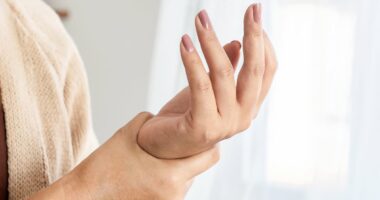Share this @internewscast.com
A top doctor has revealed the common shower accessory she would never use—warning it can harbour bacteria and mould that trigger skin infections.
Dr. Sasha Haddad, a family doctor based in the US who has amassed 1.2 million followers on TikTok, shared a tip in a video that has reached over 117,000 views.
In it, she listed three everyday shower habits she avoids – and one in particular sparked debate online.
The item in question? The loofah.
Although traditionally crafted from dried tropical gourds, loofahs now often consist of synthetic mesh and are common bathroom items. However, Dr. Haddad expressed she would never use one.
‘It’s damp, filled with bacteria and mould, and you don’t want to rub that back into your skin,’ she explained.
The clip prompted a flood of comments from viewers, with many asking what they should use instead as they ‘don’t feel clean’ without their loofah.
In replies, Dr Haddad recommended a washcloth that can be replaced regularly, or a silicone scrubber.

It was one of three things the family medicine doctor, Dr Sasha Haddad said she’d never use


In a recent video posted on TikTok Dr Sasha Haddad warned they can harbor harmful bacteria
One TikTok user inquired: ‘Why can’t people simply rinse their loofah and let it dry in the sun? Naturally, if you leave something damp in an enclosed area, it will become a breeding ground for various things.’
Dr. Haddad responded: ‘Potentially, if a disinfectant is applied and the loofah is sun-dried, it might achieve a mild disinfectant effect. Yet, I doubt everyone will do this each time they shower.’
Her warning echoes advice from Orlando-based dermatologist J. Matthew Knight, who has also urged people to ditch netted loofahs.
He explained that the mesh traps dead skin cells released when scrubbing, creating the perfect breeding ground for germs.
‘When you leave them in a warm and damp shower environment, it’s ideal for bacteria, yeast, and mould to thrive,’ she explained to Women’s Health.

She also warned against the potentially life-threatening dangers of getting your neck cracked
Research indicates that loofahs can carry harmful bacteria such as E. coli, staphylococcus, streptococcus, and pseudomonas, which all have the capacity to lead to severe, potentially life-threatening infections.
In her TikTok video, Dr Haddad also warned she would ‘never let anyone crack her neck’, explaining: ‘They can dissect an artery which, while rare, can leave you with a stroke. Call it bad luck, I’ve seen it three times this year. I’m not taking that risk.’
Her comments struck a chord with viewers who shared their own experiences of the little-known danger.
One wrote: ‘Young stroke survivor here. I would absolutely never let anyone crack my neck either now. This is good advice and people have no idea about the risk. I don’t even like firm massages now.’
Another added: ‘I had my neck cracked; the carotid artery was dissected and caused a stroke which led to the loss of my peripheral vision and loss of my professional driver’s licence.’
Earlier this year the Daily Mail reported on 28-year-old Caitlin Jenson, who was left with four severed arteries in her neck after going to a chiropractor.
During the session, the therapist performed an adjustment—a sudden twist and pull of her head to ‘align the spine’.
She collapsed shortly afterwards, unable to speak or move, and was later told the injury had triggered a series of strokes and heart attacks.
Although Caitlin has regained some movement in her head, arms and legs, she remains unable to speak, is partially blind and relies on a wheelchair.
The final thing Dr Haddad said she would never do is share make-up—particularly mascara—which she described as the ‘easiest way to spread eye infections’.
She explained this can include conjunctivitis and styes, both of which can be painful and irritating.













